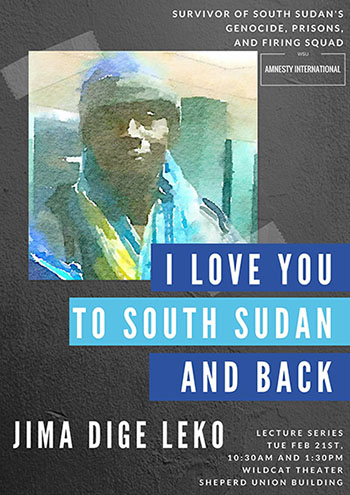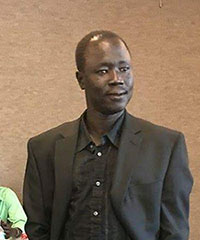Sudanese Genocide Survivor to Speak at WSU
OGDEN, Utah – Jima Dige “Philip” Leko, who twice escaped with his life from the genocide of Sudan, will describe his experiences and discuss the nation’s civil war at Weber State University, Feb. 21 at 10:30 a.m. and 1:30 p.m. in the Shepherd Union Wildcat Theater.
 Hosted by Amnesty International, Leko’s presentations are meant to raise awareness about the civil war and ethnic cleansing in South Sudan that has received little attention in the United States.
Hosted by Amnesty International, Leko’s presentations are meant to raise awareness about the civil war and ethnic cleansing in South Sudan that has received little attention in the United States.
Following two civil wars lasting from 1955-72 and 1983-2005, South Sudan split from Sudan to became the world’s youngest nation in 2011. However, conflict between South Sudan's president and his former deputy escalated into a civil war in December 2013, which has often been fought along ethnic lines.
“South Sudan stands on the brink of an all-out ethnic civil war, which could destabilize the entire region,” Yasmin Sooka, the United Nation's chief human rights expert, told the Human Rights Council in Geneva in December 2016.
In three years, more than 50,000 have died; 1.6 million people have been internally displaced, and another 1 million people have fled to neighboring countries. Starvation and human rights violations are rampant. Only 10 percent of children attend school, and an additional 18,000 children have been recruited as soldiers.
“The governments of South Sudan and Sudan have been detaining and executing reporters of opposing viewpoints for decades,” said Wirtjo Leonard, a member of WSU’s Amnesty International. “There is also high pressure not to allow international organizations like Human Rights Watch and Amnesty International into the area. This makes it really, really hard to create international awareness on the issue.”
 Leko, who lives in Salt Lake City, fled his village during the genocide of 1997. He and his family lived in an Ethiopian refugee camp for three years until receiving asylum in the United States. After becoming a U.S. citizen, he returned to South Sudan in April 2015 to help build a school. Soon after his arrival, he was falsely arrested, imprisoned, tortured and set to be executed for conspiring with rebel groups. For six harrowing months, he was shuttled around various detention facilities.
Leko, who lives in Salt Lake City, fled his village during the genocide of 1997. He and his family lived in an Ethiopian refugee camp for three years until receiving asylum in the United States. After becoming a U.S. citizen, he returned to South Sudan in April 2015 to help build a school. Soon after his arrival, he was falsely arrested, imprisoned, tortured and set to be executed for conspiring with rebel groups. For six harrowing months, he was shuttled around various detention facilities.
Eventually friends in the U.S. and South Sudan were able to involve the U.S. Embassy, and Leko was able to return to the United States in January of 2016.
“Refugees very rarely have opportunities to discuss the abuses they faced in their home countries and how it impacted them,” Leonard explained.
The campus community is invited to hear Leko’s story. The event is sponsored the Amnesty International and the College of Social & Behavioral Sciences.
Visit weber.edu/wsutoday for more news about Weber State University.
Allison Barlow Hess, Director of Public Relations
801-626-7948 • ahess@weber.edu- Contact:
Stephanie Wolfe, Political Science assistant professor
801-626-6694 • stephaniewolfe@weber.edu
